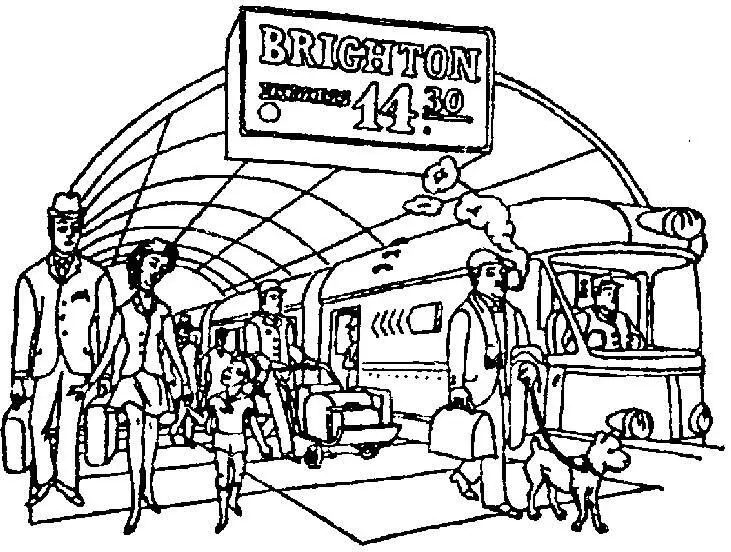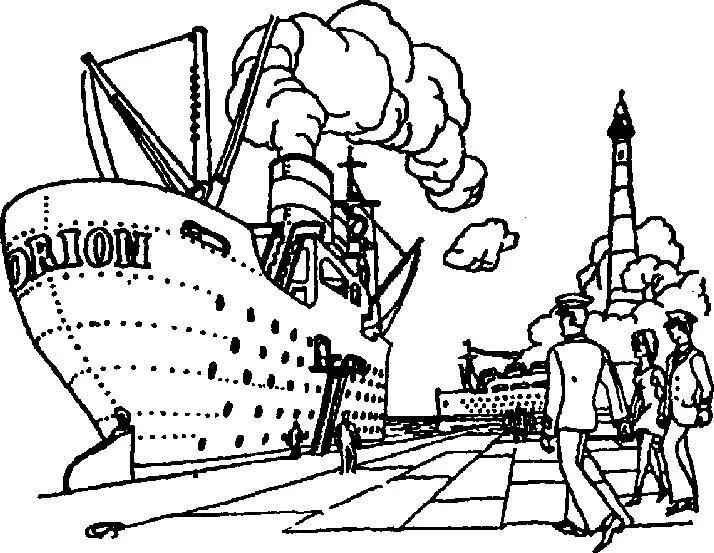Яков Аракин - Практический курс английского языка 2 курс
- Название:Практический курс английского языка 2 курс
- Автор:
- Жанр:
- Издательство:ВЛАДОС
- Год:2005
- ISBN:нет данных
- Рейтинг:
- Избранное:Добавить в избранное
-
Отзывы:
-
Ваша оценка:
Яков Аракин - Практический курс английского языка 2 курс краткое содержание
I - V курсов педагогических вузов.
Цель учебника – обучение устной речи на основе развития необходимых автоматизированных речевых навыков, развитие техники чтения, а также навыков письменной речи.
Практический курс английского языка 2 курс - читать онлайн бесплатно полную версию (весь текст целиком)
Интервал:
Закладка:
confessing ... everything? 17. The situation is very awkward, but I think I can help ... it. 18. ... other
words you haven't obeyed ... my instructions. 19. They ran ... carriage ... carriage ... the platform. 20.
He said it... a fit... anger. 21. She nodded ... me ... a grave air. 22. It's a mystery ... me. 23. I wasn't
satisfied ... her vague answer. 24. I can't tell you how we all miss ... you. 25. I can't do ... this text-
book. 26. I can hardly see anything ... this light. 27. Do you think I can do my lessons when you are
standing ... the light? 28. Has he many pupils ... hand?
X. Translate these sentences into Russian:
1. Sitting at her bureau she gazed at the familiar objects around her. 2. You've done me a
great service. How shall I ever be able to repay you for your kindness? 3. It will never do to obey
your every impulse. 4. In this town you'll never find a nursery-maid for love or money. People here
have lost taste for domestic service. 5. In his handsomeness and assurance Charles Ivory was
dramatically impressive. 6. It was only two weeks later that Frank took his departure from Waterman
and Company. 7. By this time Silver had adopted quite a friendly and familiar tone. 8. That was how
he always remembered her afterwards: a slender girl waving farewell to him from the sunlit porch.
XI. Try your band at teaching.
Say what yon would do in the teacher's position:
Mary was an excellent pupil from the first day she entered school. She was known to all the
teachers as "the exceptionally bright girl." She was the envy of many children who openly admitted
that they would like to be like her. At home, she was placed on a pedestal," nothing was ever denied
to her. The children expected and accepted that Mary's work was always perfect. One can imagine
the shock everyone experienced when one day Mary flew into a rage when she missed three words
in a spelling test, and her results were worse than some others'. First Mary tore up her paper, then she
proceeded to tear up her spelling book. She screamed that the others cheated, that she was always the
best and always will be.
ХII. a) Retell the text: 1) in the third person; 2) as if yon ware the narrator's
friend who was leaving for America; 3) as if you were the young American lady; 4) as
if yon were Le Ros.
b) Give a summary of the story.
ХIII. Translate these sentences into English:
1. Что-то помешало мне пойти на прощальный ужин. 2. Лицо моего спутника
показалось мне знакомым, я, должно быть, где-то видел его раньше. 3. Его критические статьи
приносят молодым авторам большую пользу. 4. Рекомендательное письмо не произвело на
директора никакого впечатления. 5. Он сам зарабатывает себе на жизнь с 16 лет. 6. Я сделал
все возможное, чтобы помешать его отъезду. 7. Не читай при свете свечи, это очень вредно
для глаз. 8. Справочное (information) бюро находится через два дома отсюда. 9. Он очень
общительный человек. 10. За то, что ты не слушался, ты не получишь сегодня мороженого на
сладкое. И. Не загораживай свет, я не могу разобрать, что здесь написано. 12. В былые
времена московские улицы освещались газом. 13. Не завидуйте его заработку: если вы будете
работать столько же, сколько работает он, вы будете зарабатывать не меньше. 14. Мы все были
растроганы его прощальной речью.
XIV. Act out the scene:
"Where are you for?" the train conductor asked an old lady.
"You're very impertinent," snapped the old lady. "What business is it of yours where I am
going? But if you must know, I am bound for Boston."
The conductor obligingly picked up her three bags, found her a seat in the Boston train and
put the bags on the rack. As he left the carriage, the old lady leaned out of the window and cackled at
him. "I guess I fooled you, you impertinent young man. I'm really going to Buffalo."
XV. Go over the text of Unit 8 again to discuss the following in class. Let
someone agree or disagree and express their own opinion (see the Prompts
suggested):
1. What kind of man is described in the character of Le Ros? Do you consider the character
true to life or is it exaggerated? Which method of characterization does the author use, direct or
indirect? (Prove your point.) 2. Is the story just an amusing anecdote or does it contain elements of
social satire? (Prove your point) 3. Which lines and passages bear touches of humour? What type of
humour prevails in the story? Compare the story with "How We Kept Mother's Day." Which of the
two do you consider more amusing and why? Which is more true to life? Which raises more
important problems? 4. What can you say about the language of the story? (Touch on: a) selection of
words, b) syntax.)
Prompts: true enough; absolutely/exactly/quite; I couldn't agree more; yes, but surely you
don't think; yes, but on the other hand; as I see it, in my view (opinion); personally I believe (I feel);
I'd just like to say, the way I see it; if you ask me: it's like this; oh, surely not, Vd rather not say
anything about.
LABORATORY EXERCISES (I)
1. Listen to the text "Seeing People Оff", mark the stresses and tunes. Repeat it
following the model.
2. Respond to the given questions according to the model.
3. Extend the statements. Express your disbelief, surprise or doubt in response to the
given sentences. Follow the models.
4. Write a spelling-translation test: a) translate the phrases into English; b) check them
with the key.
5. Listen to the text "Climbing" or some other text on the topic "Seeing People off" and
write it as a reproduction.
6. Listen to the poem "Adieu, adieul.." by G. G. Byron. Mark the stresses and tunes,
repeat it following the model and learn it by heart.
TOPIC: TRAVELLING
TEXT A. DIFFERENT MEANS OF TRAVEL .



A l e x : Personally 1 hate seeing people off. I prefer being seen off myself. I'm extremely
fond of travelling and feel terribly envious of any friend who is going anywhere. I can't help feeling I
should so much like to be in his place.
B e r t : But what method of travelling do you prefer?
A.: For me there is nothing like travel by air; it is more comfortable, more convenient and of
course far quicker than any other method. There is none of the dust and dirt of a railway or car
journey, none of the trouble of changing from train to steamer and then to another train. Besides,
flying is a thrilling thing. Don't you agree?
В.: I think I should like to say a word or two for trains. With a train you have speed, comfort
and pleasure combined. From the comfortable corner seat of a railway carriage you have a splendid
view of the whole countryside. If you are hungry, you can have a meal in the dining-car; and if the
journey is a long one you can have a wonderful bed in a sleeper. Besides, do you know any place
that's more interesting than a big railway-station? There is the movement, the excitement, the gaiety
of people going away or waiting to meet friends. There are the shouts of the porters as they pull
luggage along the platforms to the waiting trains, the crowd at the booking-office getting tickets, the
hungry and thirsty ones hurrying to the refreshment rooms before the train starts. No, really! Do you
know a more exciting place than a big railway-station?
С е с i l : I do.
A.: And that is?
C: A big sea port, For me there is no travel so fine as by boat. I love to feel the deck of the
boat under my feet, to see the rise and fall of the waves, to feel the fresh sea wind blowing in my
face and hear the cry of the sea-gulls. And what excitement, too, there is in coming into the harbour
and seeing round us all the ships, steamers, cargo-ships, sailing ships, rowing boats.
A.: Well, I suppose that's all right for those that like it, but not for me. I'm always seasick,
especially when the sea is a little bit rough.
В.: I've heard that a good cure for seasickness is a small piece of dry bread.
A.: Maybe; but I think a better cure is a large piece of dry land.
D a v i d : Well, you may say what you like about aeroplane flights, sea voyages, railway
journeys or tours by car, but give me a walking tour any time. What does the motorist see of the
country? But the walker leaves the dull broad highway and goes along little winding lanes where
cars can't go. He takes mountain paths through the heather, he wanders by the side of quiet lakes and
through the shade of woods. He sees the real country, the wild flowers, the young birds in their nests,
the deer in the forest; he feels the quietness and calm of nature.
And besides, you are saving your railway fare travelling on foot No one can deny that
walking is the cheapest method of travelling,
So I say: a walking tour for me.
(From "Essential English for Foreign Students" by С. E. Eckersley, Book 4, Lnd., 1955)
TEXT В. АТ ТНЕ STATION
F.: Well, here we are at last! When I get into the boat-train,71 I feel that holidays have already
begun. Have you got the tickets, Jan?
J.: Yes, here they are. I booked seats for you and me; trains are usually crowded at this time.
We have numbers A 26 and A 30; two corner-seats in a non-smoker, one seat facing the engine, one
71 boat-train:the train that takes passengers to a ship
back to the engine. Is that all right?
F.: That's very good, Jan. I don't like going a long journey in a smoker. May I sit facing the
engine?
J.: Of course! You can take whichever seat you like. As a matter of fact, I really prefer sitting
with my back to the engine. Here's our carriage, A, and here's our compartment. You can get into the
train now.
F.: Lucy, won't you come into the carriage with me? You will be wanner inside.
Читать дальшеИнтервал:
Закладка:





![Владимир Аракин - Практический курс английского языка 3 курс [calibre 2.43.0]](/books/1072035/vladimir-arakin-prakticheskij-kurs-anglijskogo-yazyk.webp)




